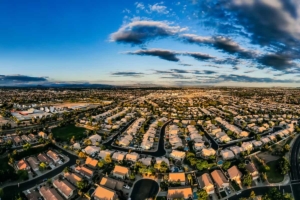A recent survey of commercial real estate brokers shows the market is poised for a continued slow and steady recovery, for at least another six months. The latest survey conducted by ASU’s W. P. Carey School of Business reflects changes in attitude now that the Presidential election is over. Responses show confidence has returned. “There are a number of people who believe that the new administration is going to give us 24 more months of expansion, especially in Arizona,” said one of the forum members. Experts say the Phoenix-area commercial real estate market is on solid ground, and they feel optimistic about the future. But near-term activity will likely continue to be slow in some submarkets.
“Growth continues, projects are getting done and they are in line with demand. There is also an indication that the recovery is beginning to spread to sub-markets previously unaffected, meaning benefits are becoming more widespread,” said Mark Stapp, executive director of the W. P. Carey Master of Real Estate Development program. “All Forum members wished for more activity in most segments, but see the progress. The market continues to reflect a maturing metro development pattern. We are still thought of as a “boom and bust” market but that perception shows a misunderstanding of reality. As I’ve stated previously, maybe what’s happening is we are growing up and this is a more sustainable pattern. I think as a place, we need to continue doing what is necessary to build community and that will help create a sustainable growth pattern and increase our resiliency to those potential systemic problems.”
The Spring Brokers Forum Report, a forecast of market conditions for April 2017 to September 2017 shows uncertainty waning. The event included a survey of 180 commercial real estate agents and brokers, active in the multi-family, retail, industrial, land/housing, investment, and office segments of the Phoenix market. Participants came from a variety of sectors, specializations, and brokerage houses across the Valley.
Highlights and observations from the survey for the Spring 2017 report:
Phoenix metro real estate market
59% of participants believe we are in an expansion cycle
92% responded that the metro Phoenix market is moving up
37% agree that uncertainty in the federal government is affecting the commercial real estate market and hindering our local growth potential (this is a continued downward trend that began in April 2015)
Multi-family real estate market
67% of participants believe that apartment rents are headed up in the next six months (down from 100 percent in October)
67% of participants believed that vacancies will be stationary and only 22 percent said up
100% believe class “C” apartment rents will rise
One participant commented, “Vacancies are running anywhere from three to five percent depending on what submarket you’re in and how much you’re pushing your rents. Rents seem to continue to increase, except for this little pockets that are fighting it out, in downtown Tempe for example.”
Industrial real estate market
68% of participants believe there will be spec development in the industrial space over the next six months
Only 10% of participants believed big box vacancies would go up, and 71% believed they would go down
Participant comments:
“The sectors that are very active are e-commerce, food and beverage, and new world manufacturing with robotics. These areas are paying much better wages. For example, there is a 300,000 square foot insulated glass manufacturing facility, sixty to seventy percent of the finished product will go into Southern California. They are paying $65,000 a year for positions in the plant because these are high-end manufacturing, advanced manufacturing using robotics.”
“There are a lot of manufacturers that are coming to Arizona. Arizona is going to be a huge winner in the U.S. renaissance for manufacturing.”
Office real estate market
No participants believe that office vacancy rates will go up in the next six months, while 84 percent agree that office rates will go down during that time frame
78% said they thought rents would go up and none said they would go down
Participant comments:
“The biggest problem is that we have a lot of obsolete product, it is not easy to tear it down and get it out of the market.”
“The challenge is that there is a lot of functionally obsolete space that is too expensive to tear down and there is plenty of land available.”
“The kind of office space that new companies want is different now. A big company will come to town and the office guys are talking to them about six or eight potential deals that are 150,000 to 300,000 square feet of office space along the 101 corridor, but each one of them wants to build new buildings. State Farm is a perfect example.”
Retail real estate market
56% of participants thought retail rents would go down and 31 percent said they would remain stationary
48% of participants thought Anchored Retail rents would go up continuing a downward trend begun in April 2016
Participant comments:
“Retail in the Valley runs hot and cold. There is space that companies are lining up for and other space that has been vacant for a decade.”
“I think part of the challenge comes with ownership. If you have an owner who hasn’t adapted to the new mindset of what’s possible for the space, it just sits there, because they’re waiting for things to recover and in many cases it’s just not going to recover.”
“They’re not coming back. Their businesses have evaporated into the Internet. I do think raising interest rates will help, because banks will want to lend to more local people to start businesses. I do think you’ll see a bit of renaissance in retail, where people will go for quality – experience of going to a quality restaurant. Even going to a quality tailor or something like that. People who can afford will find things that the Internet can never replace. Most of those people haven’t been able to get into business because the lending hasn’t been there.”
Capital markets
60% of participants thought there will be an increase in investment capital into the Phoenix market over the next 6 months
81% of participants say interest rates for commercial loans are headed up in the next six months
52% believe investor returns will be stationary over the next six months
Land and home real estate market
86% of participants believed land prices will continue to rise
54% of participants agree that the tight inventory of homes on the market is affecting the commercial side up from 22 percent in October
69% say homebuilders are backing out of deals
To view the full report, visit the Center for Real Estate Theory and Practice web page at http://research.wpcarey.asu.edu/real-estate/commercial-reports



